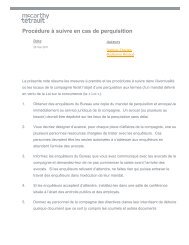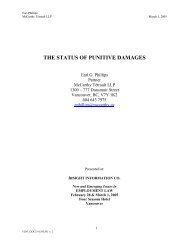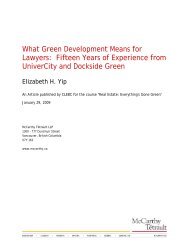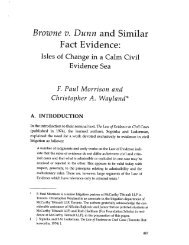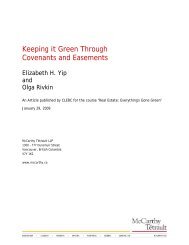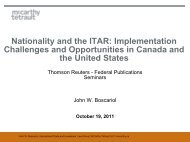The Doctrine of Public Policy in Canadian Contract Law
The Doctrine of Public Policy in Canadian Contract Law
The Doctrine of Public Policy in Canadian Contract Law
Create successful ePaper yourself
Turn your PDF publications into a flip-book with our unique Google optimized e-Paper software.
<strong>The</strong> <strong>Doctr<strong>in</strong>e</strong> <strong>of</strong> <strong>Public</strong> <strong>Policy</strong> <strong>in</strong> <strong>Canadian</strong> <strong>Contract</strong> <strong>Law</strong> 15<br />
that it is hoped will be capable, at the very least, <strong>of</strong> stimulat<strong>in</strong>g new debate <strong>in</strong><br />
relation to what has always been a highly disjo<strong>in</strong>ted area <strong>of</strong> the common law.2'<br />
H. HISTORY OF THE DOCTRINE<br />
It is useful at the outset to dist<strong>in</strong>guish between three types <strong>of</strong> policy.<br />
Firstly, there is "political policy,"22 by which is understood a position adopted<br />
by Parliament or a legislature <strong>in</strong> relation to some facet <strong>of</strong> the social, economic<br />
or general welfare. Common examples would <strong>in</strong>clude immigration or fiscal<br />
policy. Secondly there is the "policy <strong>of</strong> the law," "mean<strong>in</strong>g the object and policy<br />
<strong>of</strong> a particular law,"23 such as the policy <strong>of</strong> the Patent Act24 to encourage the<br />
public disclosure <strong>of</strong> new technologies, or the policy <strong>of</strong> the courts to favour<br />
settlement agreements <strong>in</strong> order to facilitate the expeditious resolution <strong>of</strong> disputes.25<br />
F<strong>in</strong>ally, there is "public policy" itself, which has been famously described<br />
as "that pr<strong>in</strong>ciple <strong>of</strong> the law which holds that no subject can lawfully<br />
do that which has a tendency to be <strong>in</strong>jurious to the public, or aga<strong>in</strong>st the public<br />
good."26 It is the last concept <strong>of</strong> policy which shall be exam<strong>in</strong>ed <strong>in</strong> this paper.<br />
<strong>The</strong> idea <strong>of</strong> public policy is <strong>of</strong> ancient orig<strong>in</strong>, and although it "has existed<br />
from early times. . . it has had several different names, and has on occasion<br />
21 In 1928, W<strong>in</strong>field, supra note I at I, referred to the literature on the topic as "scanty."<br />
<strong>The</strong>re exists even today a relative dearth <strong>of</strong> commentary on the theoretical basis <strong>of</strong> English<br />
and <strong>Canadian</strong> public policy as it is found <strong>in</strong> contract law, with most contract texts appear<strong>in</strong>g<br />
to content themselves with a description <strong>of</strong> the doctr<strong>in</strong>e's traditional categories. For<br />
<strong>Canadian</strong> law reform commission commentary on the doctr<strong>in</strong>e, see: <strong>Law</strong> Reform Commission<br />
<strong>of</strong> British Columbia, Report on Illegal Transactions (Vancouver: <strong>Law</strong> Reform<br />
Commission <strong>of</strong> British Columbia, 1983) at 20-21; and Ontario <strong>Law</strong> Reform Commission,<br />
Report on Amendment <strong>of</strong> the <strong>Law</strong> <strong>of</strong> <strong>Contract</strong> (Toronto: Ontario <strong>Law</strong> Reform Commission,<br />
1987) at 215-234.<br />
22 Political policy was recognized as conceptually dist<strong>in</strong>ct from public policy <strong>in</strong> Egerton v.<br />
Earl <strong>of</strong> Brownlow (1853), 4 H.L.C. 1 at 196. As there stated by Lord Truro, Isjome<br />
criticism has been wasted <strong>in</strong> relation to the language <strong>in</strong> which the pr<strong>in</strong>ciple has been<br />
expressed. Exceptions have been made to the expression <strong>of</strong> 'public policy'; and it has<br />
been confounded with what may be called 'political policy,' such as whether it is politidally<br />
wise to have a s<strong>in</strong>k<strong>in</strong>g fund or a paper circulation, or the degree and nature <strong>of</strong> <strong>in</strong>terference<br />
with foreign states, with all which, as applied to the present subject, it has noth<strong>in</strong>g whatever<br />
to do."<br />
23 Knight, supra note 2 at 216. <strong>The</strong> author, at 217-18, states that "Pit is quite clear...that the<br />
conception <strong>of</strong> public policy is not only now quite dist<strong>in</strong>ct from that <strong>of</strong> the 'policy <strong>of</strong> the<br />
law', but has, <strong>in</strong> fact, always been so, save for some exceptional <strong>in</strong>stances <strong>of</strong> confusion<br />
which have had no substantial effect on the general course <strong>of</strong> authority."<br />
24 R.S.C. 1985, c. P-4.<br />
25 See M. (J.) v. Bradley (sub nom. M. (J.) v. B. (W.)) (2004), 71 O.R. (3d) 171 (C.A.) at<br />
para. 65 [QL].<br />
26 Egerton v. Earl <strong>of</strong> Brownlow (1853), 4 H.L.C. 1 at 196.



